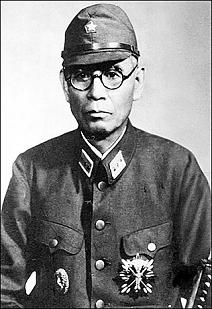![]() The Pacific War Online Encyclopedia
The Pacific War Online Encyclopedia
|
| Previous: Okamoto Yasuyuki | Table of Contents | Next: Okawachi Denshichi |

Japanese Army. Via Wikipedia Commons
Okamura Yasutsuga (Okamura Yasuji according to some sources) was born in Kyoto prefecture and graduated from the Japanese military academy in 1904. He graduated from the Army Staff College in 1913 and served on the General Staff during the First World War.
Together with Nagata Tetsuzan, Obata Toshishiro, and Tojo Hideki, Okamura helped organize an informal study group of field-grade officers that became the One Evening Society in May 1929. Okamura, Nagata, and Obata had served as military attachés in Europe and were impressed with Ludendorf's philosophy of total war, and the One Evening Society subverted the admissions process to the Staff College to reduce the influence of the conservative Choshu clan.
Okamura was
a military adviser to a Chinese
warlord during the 1920s and was deputy commander of Shanghai Expeditionary Army in
1932. In his memoirs, he admitted to playing a leading role in beginning the comfort system while posted to Shanghai. Later he served in several staff positions with Kwantung
Army. As commander of 11 Army in 1938, he advocated
renewed ground offensives to destroy the remaining Chinese armies as
the only way out of the China Incident. Attacked by a Chinese
counteroffensive in December 1939, his forces were then scattered and
lacking reserves, but regrouped by January 1940 and defeated the
Chinese offensive.
Okamura was given command
of the North China Area Army
in July 1941. During his time as commander he instituted the Three Alls Policy ("Kill all, burn
all, loot all"). He commanded 6
Area Army from August 1944, and became commander of China Expeditionary Army in
late
November or early December. He launched the massive Ichi-go offensive against American airfields in southern
China in May-November 1944, which was
largely successful in its
objectives.
In January 1945, Okamura confidently predicted
utter defeat for the Allies
in China. He contemptuously rejected the Potsdam Declaration,
stating that "I am firmly convinced that it is time to exert all our
efforts to fight to the end, determined that the whole army should die
an honorable death without being distracted by the enemy's peace
offensive." He transmitted a message to the Army General Staff via the
Japanese ambassador in Nanking on 15 August 1945 (Frank 1999):
Such a disgrace as the surrender of several million troops without fighting is not paralleled in the world's military history, and it is absolutely impossible to submit to unconditional surrender of a million picked troops, in perfectly healthy shape, to the Chungking forces of defeated China.
Things did not turn out that way, and he surrendered to Chiang Kai-shek at the close of hostilities. A fervent anti-Communist, he would remain in China to advise Chiang (who absolved him of responsibility for any war crimes) until 1949, when he returned to Japan and helped create the Self-Defense Forces.
| 1884
|
Born in Kyoto prefecture |
|
| 1904 |
Graduates from Military Academy
and assigned to 1 Regiment |
|
| 1913 |
Graduates from Army Staff College |
|
| 1923 |
Army General Staff |
|
| 1925 |
13 Regiment |
|
| 1927 |
1 Regiment |
|
| 1927 |
Colonel
|
Commander, 6 Regiment |
| 1928 |
Chief of historical section,
Army General Staff |
|
| 1929 |
Chief of assignment section,
Personnel Bureau, Ministry of War |
|
| 1932 |
Vice chief of staff, Shanghai Expeditionary Army |
|
| 1932 |
Chairman of military
investigation, Ministry of War |
|
| 1932-8-8 |
Vice chief of staff, Kwantung Army |
|
| 1933 |
Military attaché, Manchukuo |
|
| 1934-12-10 |
Lieutenant General | Head of 2 Bureau, Army General
Staff |
| 1936-3-23 |
Commander, 2 Division |
|
| 1938-6-23 |
Commander, 11 Army |
|
| 1940-3-9 |
General |
Supreme War Council |
| 1941-7-1
|
Commander, North China Area
Army |
|
| 1944-8-25
|
Commander, 6 Area Army |
|
| 1944-11-23
|
Commander, China
Expeditionary Army |
|
| 1946 |
Military advisor to Kuomintang |
|
| 1949 |
Repatriated |
|
| 1966 |
Dies |
References
Dupuy
et al. (1992)
Frank (1999)
Generals.dk (accessed 2007-11-15)
The Pacific War Online Encyclopedia © 2007-2009, 2011, 2013 by Kent G. Budge. Index